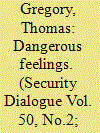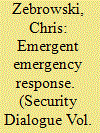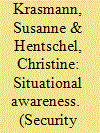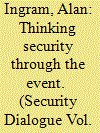|
|
|
Sort Order |
|
|
|
Items / Page
|
|
|
|
|
|
|
| Srl | Item |
| 1 |
ID:
165014


|
|
|
|
|
| Summary/Abstract |
The securitization of health concerns within the European Union has hitherto received scant attention compared to other sectors. Drawing on the conceptual toolbox of actor-network theory, this article examines how a ‘health security assemblage’ rooted in EU governance has emerged, expanded, and stabilized. At the heart of this assemblage lies a particular knowledge regime, known as epidemic intelligence (EI): a vigilance-oriented approach of early detection and containment drawing on web-scanning tools and other informal sources. Despite its differences compared to entrenched traditions in public health, EI has, in only a decade’s time, gained central importance at the EU level. EI is simultaneously constituted by, and performative of, a particular understanding of health security problems. By ‘following the actor’, this article seeks to account for how EI has made the hunt for potential health threats so central that detection and containment, rather than prevention, have become the preferred policy options. This article draws out some of the implications of this shift.
|
|
|
|
|
|
|
|
|
|
|
|
|
|
|
|
| 2 |
ID:
165015


|
|
|
|
|
| Summary/Abstract |
Between 2006 and 2007 an average of one Iraqi civilian was killed or injured at a coalition checkpoint each day. In many cases, civilians were shot because soldiers had misinterpreted their behaviour as hostile or as a demonstration of hostile intent. In other words, the soldiers responsible thought that they were acting in self-defence against an imminent threat. Some analysts have argued that these killings can be explained by ambiguities in the rules of engagement, but such explanations wrongly assume that the decision to kill is a purely rational calculation. Drawing upon the work of Sara Ahmed, William Connolly and George Yancy, I will argue that the interpretation of hostile intent and the decision to use lethal force are affective judgements rather than purely conscious decisions and, as such, are shaped by feelings, moods and intuitions. Moreover, I will argue that these judgements are never entirely neutral but clouded by a set of pre-existing assumptions that mark certain bodies as dangerous before they even have a chance to act. Drawing upon an archive of incident reports filed in the aftermath of these shootings and interviews with former soldiers, this article will show how seemingly innocuous behaviours were so readily mistaken for hostile acts with decidedly deadly consequences for the local population.
|
|
|
|
|
|
|
|
|
|
|
|
|
|
|
|
| 3 |
ID:
165016


|
|
|
|
|
| Summary/Abstract |
Emergency responses are premised on the hope that, even when events cannot be wholly predicted and prevented, timely action in the present can be exercised to strip an emergent event of its disruptive potential. Yet, while the speed of emergency responses plays a critical role in underpinning UK resilience, it has been a relatively neglected subject in studies of resilience advanced through the paradigm of preparedness. This article aims to contribute to and extend work in the field of emergency governance by arguing that concerns surrounding the speed of response contribute to a distinct form of security enacted in contemporary emergency response strategies, which I term ‘event suppression’. Drawing on policy analysis, preparedness exercise observations and practitioner interviews, this article investigates how speed operates as a core problematic informing the design of UK emergency responses, organized through the Integrated Emergency Management framework. Integrated Emergency Management promises to accelerate emergency response operations by utilizing advances in communications technologies to drive the bottom-up emergent self-organization of emergency responses. Event suppression ensures security not by preventing an event from happening, but by quickly closing down the ‘disruptive’ time of the emergency event and restoring the linear historical time of standard political processes.
|
|
|
|
|
|
|
|
|
|
|
|
|
|
|
|
| 4 |
ID:
165018


|
|
|
|
|
| Summary/Abstract |
The emergence of ‘situational awareness’ as a response to the perception of a new terrorism in European cities marks a significant shift in the conceptualization of security. Focusing on a recently introduced German Federal Police programme that trains ordinary officers in their capability to handle ‘complex life-threatening situations of police operation’, the article explores how situational awareness introduces a warrior logic into policing and urban subjectivity and modifies our understanding of security at large. It points us to the limitations of preparedness and concretizes the hitherto elusive call to resilience. Three analytical dimensions – space–time, sensing and connectivity – will be developed to render the situation thinkable for empirical research as well as to grasp security as a ‘live’ mode of government.
|
|
|
|
|
|
|
|
|
|
|
|
|
|
|
|
| 5 |
ID:
165017


|
|
|
|
|
| Summary/Abstract |
While the turn towards materiality over the course of the last decade has enriched studies of security in a variety of ways, the security field continues to pose challenges for materially oriented thinking. This article argues that while recent materially oriented work on security has been concerned with events, working through the question of the event as a central analytical strategy is a promising way of addressing such challenges and developing broader insights. The article develops this argument by working through a particular event, the killing of the former Russian security agent Alexander Litvinenko in London in 2006 by means of the radioactive element polonium 210. Approaching the event via the archive and report of the public inquiry that subsequently took place into it, and reflecting further on the utility of Bruno Latour’s idea of dingpolitik for materially oriented work on security, the article explores transformations of materiality, politics and publicity, and draws out how polonium 210 came to figure in the killing and the inquiry as actant, trace and evidence. In conclusion, the article reflects on the conceptual value of working through events and the methodological issues raised in the analysis.
|
|
|
|
|
|
|
|
|
|
|
|
|
|
|
|
|
|
|
|
|